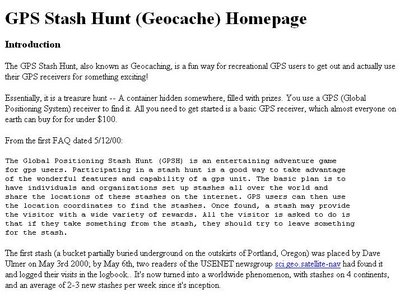No, no, I'm not talking about the famous Scholtzsky's sandwich; I'm talking about the original Geocaching website created back in May 2000 shortly after the end of Selective Availability.
 Thanks to the miracles of the Wayback Machine's web archiving abilities, it is possible to go back-in-time to visit old websites that are no longer in existence or previous versions of current websites. Using the Wayback Machine, it is possible to visit Mike Teague's original GPS Stash Hunt website which listed the rules of geocaching, provided the coordinates for all caches in the 11 states with caches, and provides links to Dave Ulmer's document entitled, "Introduction to Recreational Geocaching."
Thanks to the miracles of the Wayback Machine's web archiving abilities, it is possible to go back-in-time to visit old websites that are no longer in existence or previous versions of current websites. Using the Wayback Machine, it is possible to visit Mike Teague's original GPS Stash Hunt website which listed the rules of geocaching, provided the coordinates for all caches in the 11 states with caches, and provides links to Dave Ulmer's document entitled, "Introduction to Recreational Geocaching."
 The following is a short excerpt from this original guide to Geocaching. The original can be viewed on the Wayback Machine.
The following is a short excerpt from this original guide to Geocaching. The original can be viewed on the Wayback Machine.
 Thanks to the miracles of the Wayback Machine's web archiving abilities, it is possible to go back-in-time to visit old websites that are no longer in existence or previous versions of current websites. Using the Wayback Machine, it is possible to visit Mike Teague's original GPS Stash Hunt website which listed the rules of geocaching, provided the coordinates for all caches in the 11 states with caches, and provides links to Dave Ulmer's document entitled, "Introduction to Recreational Geocaching."
Thanks to the miracles of the Wayback Machine's web archiving abilities, it is possible to go back-in-time to visit old websites that are no longer in existence or previous versions of current websites. Using the Wayback Machine, it is possible to visit Mike Teague's original GPS Stash Hunt website which listed the rules of geocaching, provided the coordinates for all caches in the 11 states with caches, and provides links to Dave Ulmer's document entitled, "Introduction to Recreational Geocaching." The following is a short excerpt from this original guide to Geocaching. The original can be viewed on the Wayback Machine.
The following is a short excerpt from this original guide to Geocaching. The original can be viewed on the Wayback Machine.Geocaching is a new 21st century recreation that came about as a result of the improving accuracy of electronic Global Positioning System (GPS) devices. With improved positional accuracy on the order of three meters, GPS's now allow unskilled users the ability to find geographic locations with precision and repeatability. With this new ability, people can now place geocaches in interesting places so that others can enjoy the challenge of finding them. This is called Recreational Geocaching.
Geocache and Geocaching are new words developed to easily communicate the act of placing an object at a geographical location and recording its position. Geocache can be used as a noun or a verb. A geocache is an item or group of items located at a recorded geographical position. To geocache, is to place the object and record its position. Geocaching, the act of placing or locating geocaches. Geocaching is also used to describe the sport or recreation of geocaching. A geocacher is a person involved in geocaching.
2 comments:
Amazing how fast geocaching has grown. Looking at the archives was fun. Especially seeing the number of active caches listed at the time.
Thanks for the memories !! I was a pilot and an avid reader of sci.geo.satellite-nav in 2000. I was lucky enough to witness the birth of geocaching. I remember Dave's post and I remember thinking "What a cool idea!". I have followed geocaching from the beginning. When I joined GC.com, there was one cache 18 miles from my home and I believe it was the only cache in our state. Sadly, I became very ill at the time and never started geocaching. I followed the websites and forums year by year and finally late last year, my MS went into remission to a degree that I could finally start caching. In five months, I have logged 87 finds and 2 hides. I feels great to be back outdoors and physically active again.
Thank you to you and all the other cachers that have posted your adventures on the web and inspired me to get outside and get active!
Post a Comment